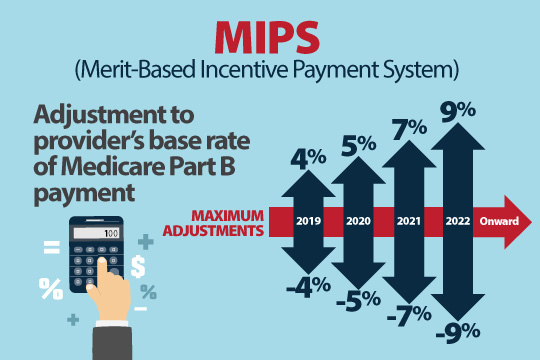Medical schools teach doctors the medical knowledge they need to be able to treat and prevent diseases. Residency polishes this knowledge and sharpens clinical skills. No instruction was provided regarding business management or dealing with regulations. Yet, in order to survive, doctors must learn these attributes in real-time, often under danger of financial insolvency or economic penalties. However, the MACRA bill seems to be a direct threat aimed at doctors.
When EHRs rolled out, doctors protested their mandatory use. Many refused to comply, even when the meaningful use program was implemented and they were compelled to participate or pay penalties. Doctors, for the most part, did not feel the technology was up-to-date with what was being asked of us to do. Yet, we were coerced to do it anyway. However, when the third stage of the program arrived to be implemented, the realization that interoperability of EHR systems didn’t work and the program became unsustainable. Rather than listen to doctors’ concerns, however, the government again took matters into their own hands and tried to fix two problems (the SGR and MU) under the umbrella of one bill. Despite protests from doctors, the MACRA bill was signed into law and doctors are enslaved to its tenants, flawed though they may be.
How is MACRA a threat aimed at physicians?
- We are told before it is even implemented the percentage of doctors in small practices who will be negatively adjusted.
- We are also told that larger practices will be more likely to receive positive adjustments to their reimbursements.
- Smaller practices are told that it is expected that it will be near impossible for them to comply with the mandatory requirements of the program.
- The requirements are made purposefully complex to the point that sophisticated IT staff will be needed to decipher.
- MIPS disfavors patients with complicated medical problems. Those doctors who take care of sicker patients are also more likely to suffer negative adjustments.
MACRA obviously favors larger practices and seems to want to push smaller practices into the larger group model. There is no evidence that patients in larger groups do clinically better or that they are less expensive. Yet, that is what it appears the government desires.
If we look back over the recent mandates issued by the federal government, our hearts should be filled with fear. Their SGR formula was a big failure and wasted millions of taxpayer dollars. The meaningful use program was another big money draining loser as well. Yet. we now have the MACRA which contains failed elements of these programs.
Doctors again voice their concerns but no one listens. There is no reason for the government to issue a veiled threat against small medical practices. There are less than 30 percent of us private doctors left, for goodness sake. Is it really necessary to try to drive us out of business?
MACRA is here and I doubt it is going away any time soon. How much money can we afford to watch go down the drain on this one? Is it really time to wipe out private practice? Or will this be the time that physicians are finally heard?
 Copyright secured by Digiprove © 2016 Linda Girgis, MD, FAAFP
Copyright secured by Digiprove © 2016 Linda Girgis, MD, FAAFP



Thanks for the article, Dr. Linda. I totally agree with your insights on MACRA. I thought I would share this link to a letter that links MACRA with physician burnout.
http://www.mayoclinicproceedings.org/article/S0025-6196(16)30553-5/fulltext